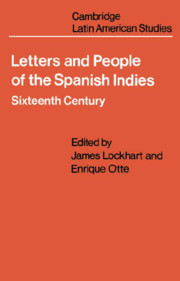Book contents
- Frontmatter
- Contents
- Preface
- Part I Conquest
- Part II The Variety of Life in the Indies
- 11 An encomendero's establishment
- 12 An encomendero's opinions
- 13 The miner
- 14 Commerce across the Atlantic
- 15 The professor of theology
- 16 The new arrival
- 17 The tanner and his wife
- 18 The troubadour
- 19 The nephew
- 20 The garden and the gate
- 21 The woman as settler
- 22 The farmer
- 23 The petty dealer
- 24 The Flemish tailors
- 25 The nobleman
- 26 The Hispanized Indian
- 27 Indian high society
- 28 An Indian town addresses the king
- Part III officials and Clerics
- Bibliography
- Index
18 - The troubadour
from Part II - The Variety of Life in the Indies
Published online by Cambridge University Press: 06 August 2018
- Frontmatter
- Contents
- Preface
- Part I Conquest
- Part II The Variety of Life in the Indies
- 11 An encomendero's establishment
- 12 An encomendero's opinions
- 13 The miner
- 14 Commerce across the Atlantic
- 15 The professor of theology
- 16 The new arrival
- 17 The tanner and his wife
- 18 The troubadour
- 19 The nephew
- 20 The garden and the gate
- 21 The woman as settler
- 22 The farmer
- 23 The petty dealer
- 24 The Flemish tailors
- 25 The nobleman
- 26 The Hispanized Indian
- 27 Indian high society
- 28 An Indian town addresses the king
- Part III officials and Clerics
- Bibliography
- Index
Summary
Sebastian de Pliego, in Puebla, to his wife Mad Diaz in Mecina-Bombaron, Granada, 1581
… I can't live without you …
Not all husbands were like the Alonso Ortiz in the preceding letter. Others were solicitous, anxious to be with their families as quickly as possible, doing everything they could towards that end. In this letter, Sebastian de Pliego, who has been in Puebla only a short while, is already writing his wife for the second time, is sending her money, and in his great concern is giving her the most detailed instructions of what to sell, buy and bring for the trip. As he goes over everything, much of it twice, he brings the whole migration procedure, from the paperwork to the sea trip, to life for us. He also reaffirms the image seen in Letter 16, of the Indies as a land of plenty, in contrast to the lack of promise in old Spain. Pliego is unusually anxious about the question of proving lineage and identity, possibly because anyone from the Granada area, so recently won from the Moors, was somewhat suspect. His reference to the possible necessity of proving the family's antecedents in Brihuega betrays much. Textile workers from the central Castilian town of Brihuega were prominent in the development of early Puebla as the center of New Spain's textile production. The connection is confirmed in the fact that ‘Juan de Brihuega’ is sending the money for Pliego. Brihuega solidarity, then, operated despite the fact that Pliego's family had lived elsewhere for some time. Pliego was doubtless somehow involved in textile-making himself.
Of course the main thing we have here is the shining expression of unbreakable ties and love in Pliego's concern, his awkward jokes, and the wooden verses which we have attempted to translate.
Very desired and beloved wife:
The present letter is to let you know that, praise God, I am in good health, with much desire to see you. In the dispatch-boat I sent you a letter as soon as I arrived here in the city of Los Angeles, telling you what to do.
- Type
- Chapter
- Information
- Letters and People of the Spanish IndiesSixteenth Century, pp. 123 - 127Publisher: Cambridge University PressPrint publication year: 1976

